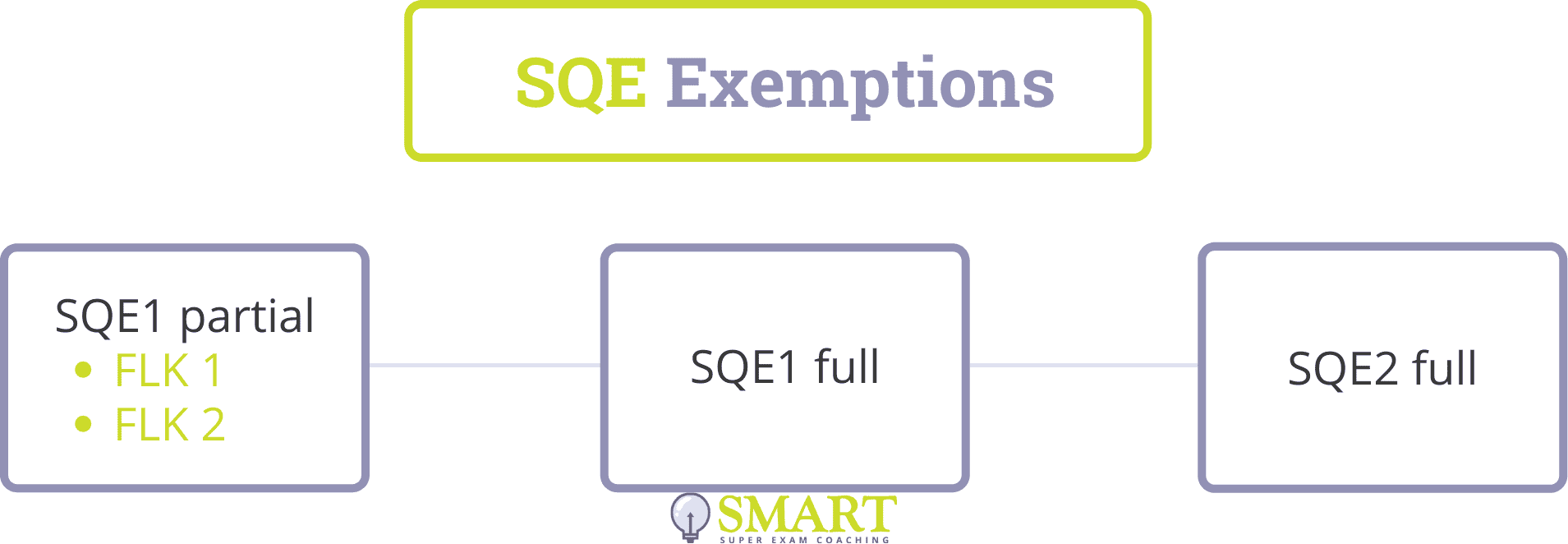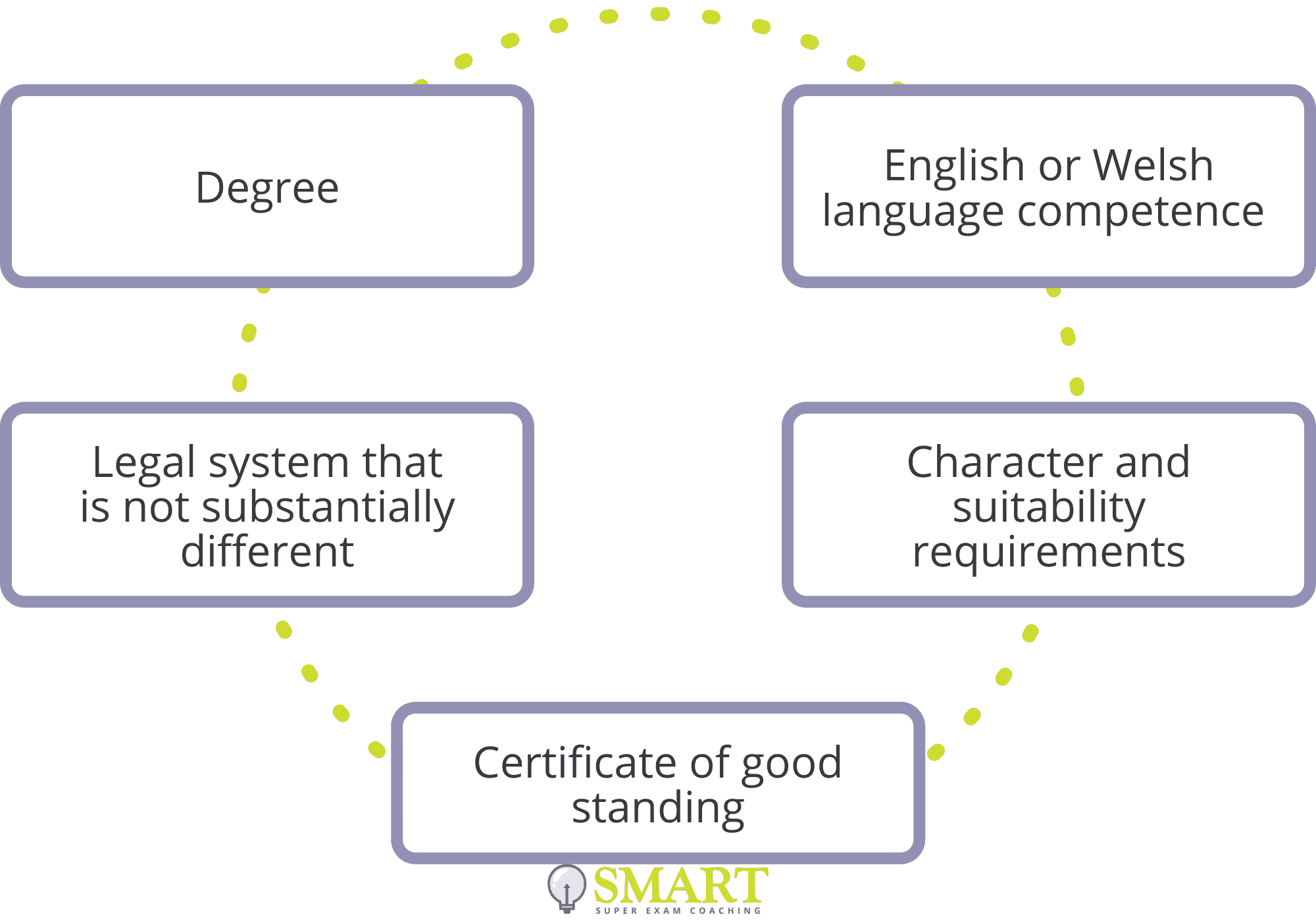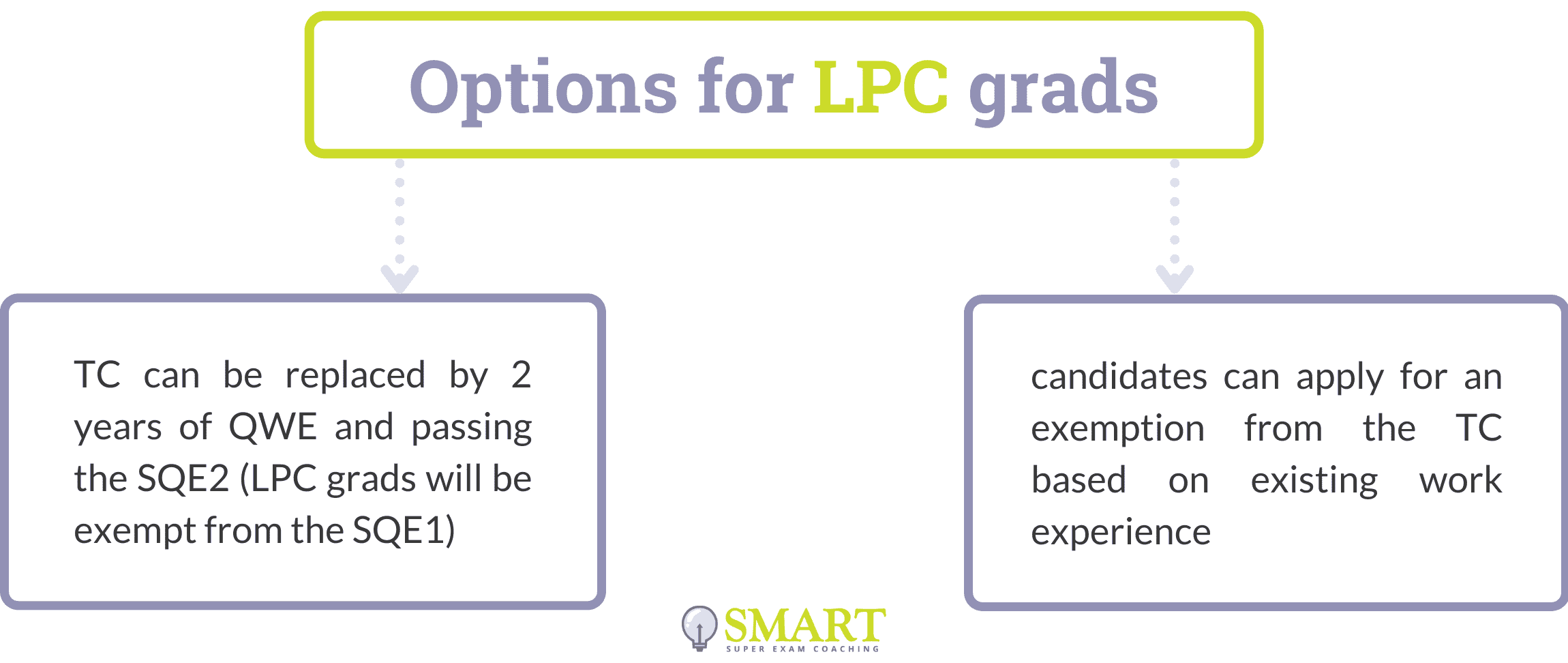The Solicitors Qualifying Examination (SQE) route to becoming a solicitor in England and Wales involves the following steps:
- Complete a degree in any subject
- Pass SQE1 (FLK1 and FLK2) and SQE2 assessments
- Complete two years of qualifying work experience (QWE)
- Meet character and suitability requirements
Depending on their background, candidates may receive exemptions from some SQE assessments. However, the SRA mandates that candidates who have failed any part of the SQE must retake and pass that specific assessment to qualify. This article will explore potential SQE exemptions for various candidate categories.
Need help? Complete our SQE exemption form and we will get back to you.
Preparing for SQE1 or SQE2? Our dedicated resources are here to help you succeed:
Exemption meaning
Candidates seeking to practise as solicitors in England and Wales can come from a range of different backgrounds, such as foreign-qualified lawyers, qualified UK barristers, or students undertaking the LPC, for example. Depending on each candidate’s level of education and experience, they may be granted an exemption by the Solicitors Regulation Authority (SRA) from all or part of the SQE assessments. This means that they have obtained the equivalent knowledge and skills of one or more SQE stage through another means, and therefore do not need to complete those stages in the SQE qualification process.
SQE exam exemptions only apply to qualified lawyers. However, in certain other cases, such as LPC grads who wish to complete their qualification through the SQE route instead of via a training contract, candidates will not need to sit the SQE1 assessments.
SQE exemptions
Depending on a candidate’s qualifications and experience, exemptions may be granted by the SRA from the following SQE assessments:
- SQE1 Functioning Legal Knowledge (FLK) 1
- SQE1 Functioning Legal Knowledge (FLK) 2
- SQE1 in full
- SQE2 in full

It is not possible to receive exemptions from just one part of an assessment. Candidates must show that their qualifications and/or experience are equivalent to the whole of a separate SQE assessment and have been acquired in a legal system that is not substantially different from the system in England and Wales.
Evidence of the following criteria must be provided when applying for SQE1 or SQE2 exemptions:
- SQE 1: Candidate’s prior qualifications and/or experience cover the areas of law which are assessed in FLK1 and/or FLK2
- SQE 2: Candidate has two years of professional work experience and holds one or more of these practising rights:
- Criminal litigation
- Civil litigation/dispute resolution
- Property practice
- Wills and intestacy, probate administration and practice
- Business organisations rules and procedures
There are no exemptions from the degree requirement, or from the English or Welsh language requirement (where applicable).
SQE1 exemptions
Aspiring solicitors who wish to obtain an SQE1 exemption must meet strict regulatory standards set by the Solicitors Regulation Authority (SRA). The bar for exemption is extremely high, as the SRA’s primary duty is to ensure public protection and uphold the integrity of the profession. The SRA holds exemption applicants to the same standard as newly qualified solicitors in England and Wales. SQE1 exemptions are only granted in exceptional cases, and all required competencies must be fully evidenced. If you are missing any areas of FLK1 or FLK2, applying for an exemption is not advisable – sitting the SQE1 exam is the safer and more effective route.
Why SQE1 Exemptions Are Rare
Exemption from SQE1 is exceptionally difficult to obtain. In the past three years, only ONE applicant has successfully secured an exemption—demonstrating the high threshold required.
Applicants must prove extensive experience in all areas of FLK1 and FLK2. If any knowledge gaps exist, an exemption will not be granted. A partial exemption for FLK1 or FLK2 is not possible.
Additionally, Level 6 academic qualifications do not meet the SQE1 threshold, as the required standard is Level 3 on the SRA’s competency framework – equivalent to a newly qualified solicitor in England and Wales.
Key takeaway:
🔹 If you cannot demonstrate full competency in all assessed areas, you should strongly consider sitting the SQE1 exam instead of applying for an exemption.
How to Apply for an SQE1 Exemption
Applicants must provide detailed, verifiable evidence of their professional experience and legal knowledge. This includes:
✔ Work Samples & Casework Evidence – Redacted legal documents that prove practical experience in each SQE1-assessed area.
✔ Corroborative References – Signed letters from supervisors or senior colleagues confirming the applicant’s role, work quality, and legal expertise.
✔ Jurisdictional Comparisons – Evidence that the law in the applicant’s jurisdiction closely aligns with that of England and Wales in all SQE1 practice areas.
✔ Practical Scenarios – A breakdown of legal work undertaken, detailing:
- The scenario
- The applicant’s involvement
- The skills demonstrated
- The outcome
Important: If any part of the application is incomplete or does not sufficiently demonstrate competency, no exemption will be granted for either FLK1 or FLK2.
SQE2 agreed exemptions
The SRA has considered legal qualifications from a number of jurisdictions, and has agreed* to grant exemptions for specific stages of the SQE in some instances:
- Austria (Rechtsanwalt) – SQE 2 exemption agreed
- Bahrain (lawyer) – SQE2 exemption agreed
- Belgium (advocaat/avocat) – SQE2 exemption agreed
- Brazil (advogado) – SQE2 exemption agreed
- Bulgaria (advocate/attorney at law) – SQE2 exemption agreed
- Cameroon (lawyer) – SQE 2 exemption agreed
- Croatia (odvejetnik/odvjetnica) – SQE exemption agreed
- Czechia (advokat) – SQE2 exemption agreed
- Denmark (advokat) – SQE2 exemption agreed
- Finland (attorney) – SQE 2 exemption agreed
- Germany (Rechtsanwalt) – SQE2 exemption agreed
- Hong Kong (solicitor) – SQE2 exemption agreed
- Hungary (ugyved) – SQE 2 exemption agreed
- Isle of Man (advocate) – SQE2 exemption agreed
- Indonesia (advocate) – SQE2 exemption agreed
- Kazakhstan (legal consultant) – SQE2 exemption agreed
- Liechtenstein (attorney) – SQE 2 exemption agreed
- Luxembourg (avocat à la Cour) – SQE2 exemption agreed
- Montenegro (odvjetnik) – SQE exemption agreed
- Netherlands (advocaat) – SQE 2 exemption agreed
- Norway (advokat) – SQE2 exemption agreed
- Poland (advocate/attorney at law) – SQE2 exemption agreed
- Romania (avocat) – SQE2 exemption agreed
- Serbia (advocate) – SQE 2 exemption agreed
- Slovakia (advokat) – SQE2 exemption agreed
- Slovenia (attorney) – SQE2 exemption agreed
- Sweden (advokat) – SQE 2 exemption agreed
- Ukraine (advocate) – SQE2 exemption agreed
* This is the information available as of August 2024, please check the SRA website for further updates.
Foreign-qualified lawyers SQE exemption
Do I have to be in one of the recognised jurisdictions as a qualified lawyer?
With some exceptions as outlined below, foreign-qualified solicitors must pass the SQE1 and SQE2 assessments in order to practise in England and Wales. They must also hold a degree and meet character and suitability requirements, but they do not need to meet the two-year qualifying work experience criteria, as the SRA will recognise their existing professional experience.
Qualified solicitors from Scotland are exempted from sitting the SQE2 assessments, and must apply for this exemption through the SRA website.
These candidates may also qualify for further SQE 1 exemptions depending on their solicitor qualifications and experience.
Qualified solicitors from Northern Ireland and the Republic of Ireland are exempted from the SQE1 and SQE2 assessments, and do not need to apply for these exemptions.
Qualified solicitors from other jurisdictions may qualify for SQE1 and/or SQE2 exemptions based on their qualifications and work experience. The qualifications or experience must be equivalent to the whole of an SQE assessment, and must be acquired in a legal system that is not substantially different from the system in England and Wales. If a qualified lawyer is granted an exemption from SQE2, they must now demonstrate their language proficiency before applying for admission as a solicitor of England and Wales (note: previously, they did not need to demonstrate this until they applied for their first practising certificate). This may be achieved through an English language test or confirming with evidence that the candidate’s degree was taught in English.

For all foreign-qualified solicitors, when applying for admission, a certificate of good standing must also be submitted for the SRA to check character and suitability requirements before granting admission.
SQE LPC exemption
Does the LPC exempt me from SQE?
Aspiring solicitors who have started the qualification process through the traditional Legal Practice Course (LPC) route (i.e. have started or accepted a place in a law degree before 21 September 2021 or have started or accepted a place in a CPE/GDL/LPC before 1 September 2021) are covered under the transitional arrangements established by the SRA. This means that these candidates can pursue this route to qualify up until 31 December 2032, or they can instead choose to complete the process through the SQE route.
For these candidates, there is no agreed exemption from the SQE assessments. However, the following options do apply for LPC graduates:
- The training contract can be replaced by two years of qualifying work experience and passing the SQE2 assessments (these candidates will not be required to sit the SQE1 assessments).
- Candidates can apply for an exemption from the training contract based on existing work experience, with detailed evidence that the Practice Skills Standards have been achieved through prior experience.

There are also CILEx exemptions for LPC graduates, so grads wanting to pursue this path to practising law can apply for full exemption from CILEx qualifications and for CILEx graduate membership. CILEx lawyers are regulated by the CILEx Regulation rather than the SRA.
CILEx SQE exemption
What options are available for CILEx?
Making further enquiries about the future status of CILEx following the introduction of the SQE we received the following response from the SRA. As a legal executive wishing to qualify as a solicitor of England and Wales there are a couple of options available to you. If you have completed, started, or accepted an offer of a place for:
- A qualifying law degree (accepted by 21 September 2021);
- The Common Professional Examination/ Graduate Diploma in Law (accepted before 1 September 2021); and
- The Legal Practice Course (accepted before 1 September 2021).

The legal executive equivalent means route is open until 31 December 2032. Alternatively you can choose to qualify through the SQE.
SQE exemption for barristers
Are barristers exempt from SQE?
Barristers (as well as CILEx practitioners or chartered legal executives) must sit and pass the SQE assessments to practise as solicitors in England and Wales. There are no agreed exemptions for these roles, but candidates may apply for an individual SQE exemption based on their qualifications and experience. Candidates must submit an SQE qualified lawyers exemption application to the SRA if they believe they may be entitled to an exemption, i.e. if their experience is equivalent to the whole of an SQE assessment and has been acquired in a legal system not substantially different to the system in England and Wales.
These candidates do not need to complete two years of SQE qualifying work experience, but will need to submit a certificate of good standing for the SRA to confirm their character and suitability requirements.
How to apply for SQE exemptions
If you believe you could be entitled to SQE exemptions under any of the categories described above, you can apply for the exemptions through the SRA website. You must create a mySRA account, obtain your SRA number, and complete the relevant form. You will need to provide detailed evidence of your experience in each area of law as relevant to the specific SQE assessment, such as certificates, transcripts, redacted work samples, and references. The exemption application form includes the following sections:
- Personal details
- Details and contact info for your current jurisdiction
- Confirm code of conduct criteria for your current jurisdiction
- Which exemption(s) you are applying for
- Examples and evidence of knowledge and experience in the areas of law and skills for (as applicable):
- SQE1 FLK1
- SQE1 FLK2
- SQE2

It is important to apply for any exemptions and have them confirmed by the SRA before booking any assessments. This should be done in conjunction with the other pre-booking steps including a diversity survey and requesting reasonable adjustments for sitting your SQE exam.
The SRA aims to make its decision on each application within 180 days for foreign-qualified lawyer SQE exemptions or for training contract exemptions for LPC graduates, or within 30 days when applying for the pre-agreed exemptions for intra-UK candidates.
How the Academy of Smart Lawyers Can Assist with Your SQE Exemption Process
- Access Our Lecture: Watch our comprehensive “SQE2 Exemption Application Guide” to understand the process in detail. Access the lecture here. A small fee applies.
- Personalised Consultation: For one-on-one assistance, complete our tailored questionnaire, designed to gather the critical information needed to evaluate your eligibility for exemptions. Once submitted, our team will reach out to provide expert advice and next steps.